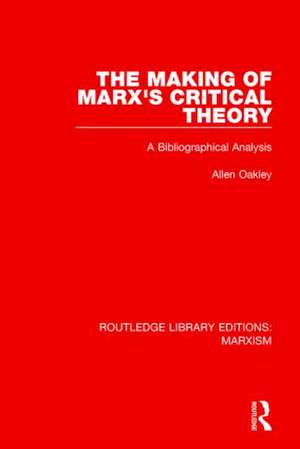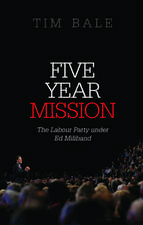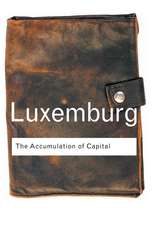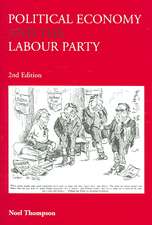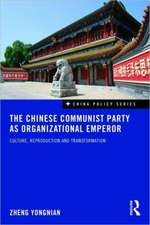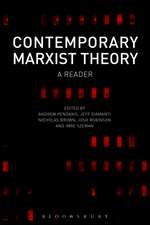The Making of Marx's Critical Theory: A Bibliographical Analysis: Routledge Library Editions: Marxism
Autor Allen Oakleyen Limba Engleză Paperback – 14 oct 2016
| Toate formatele și edițiile | Preț | Express |
|---|---|---|
| Paperback (1) | 178.76 lei 6-8 săpt. | |
| Taylor & Francis – 14 oct 2016 | 178.76 lei 6-8 săpt. | |
| Hardback (1) | 455.79 lei 6-8 săpt. | |
| Taylor & Francis – 8 apr 2015 | 455.79 lei 6-8 săpt. |
Din seria Routledge Library Editions: Marxism
- 17%
 Preț: 259.98 lei
Preț: 259.98 lei - 16%
 Preț: 241.15 lei
Preț: 241.15 lei - 17%
 Preț: 259.98 lei
Preț: 259.98 lei - 15%
 Preț: 690.42 lei
Preț: 690.42 lei - 34%
 Preț: 680.31 lei
Preț: 680.31 lei - 18%
 Preț: 985.71 lei
Preț: 985.71 lei - 16%
 Preț: 241.15 lei
Preț: 241.15 lei - 15%
 Preț: 660.26 lei
Preț: 660.26 lei - 18%
 Preț: 987.25 lei
Preț: 987.25 lei - 43%
 Preț: 172.64 lei
Preț: 172.64 lei - 18%
 Preț: 988.03 lei
Preț: 988.03 lei - 18%
 Preț: 984.18 lei
Preț: 984.18 lei - 17%
 Preț: 256.32 lei
Preț: 256.32 lei - 16%
 Preț: 241.15 lei
Preț: 241.15 lei - 16%
 Preț: 243.90 lei
Preț: 243.90 lei - 18%
 Preț: 984.18 lei
Preț: 984.18 lei - 17%
 Preț: 247.40 lei
Preț: 247.40 lei - 18%
 Preț: 1043.14 lei
Preț: 1043.14 lei - 18%
 Preț: 1259.60 lei
Preț: 1259.60 lei - 18%
 Preț: 1265.79 lei
Preț: 1265.79 lei - 16%
 Preț: 241.15 lei
Preț: 241.15 lei - 34%
 Preț: 7528.09 lei
Preț: 7528.09 lei
Preț: 178.76 lei
Preț vechi: 215.73 lei
-17% Nou
Puncte Express: 268
Preț estimativ în valută:
34.23€ • 35.31$ • 28.37£
34.23€ • 35.31$ • 28.37£
Carte tipărită la comandă
Livrare economică 20 februarie-06 martie
Preluare comenzi: 021 569.72.76
Specificații
ISBN-13: 9781138888760
ISBN-10: 1138888761
Pagini: 158
Dimensiuni: 156 x 234 mm
Greutate: 0.45 kg
Ediția:1
Editura: Taylor & Francis
Colecția Routledge
Seria Routledge Library Editions: Marxism
Locul publicării:Oxford, United Kingdom
ISBN-10: 1138888761
Pagini: 158
Dimensiuni: 156 x 234 mm
Greutate: 0.45 kg
Ediția:1
Editura: Taylor & Francis
Colecția Routledge
Seria Routledge Library Editions: Marxism
Locul publicării:Oxford, United Kingdom
Public țintă
Postgraduate and UndergraduateCuprins
1. Introduction: Marx’s Critico-Theoretical Writings: Structures and Issues 2. Before 1884: The Early Critique of Philosophy and Society 2.1. School and University 2.2. Journalism 2.3. Critique of Political Philosophy 3. 1884 to 1856: The Criticism of Capitalism and the Formulation of Historical Materialism 3.1. Paris: Political Economy and the Critique of Capitalism 3.2. Brussels: Political Economy and Historical Materialism 3.3. London: Political Economy Again 4. 1857 to 1860: The Grundrisse and its Consequences 4.1. The Bibliography in Outline 4.2. The Grundrisse Manuscript 4.3. The Plans of the Grundrisse Period 4.4. The Interim Development of the Grundrisse Manuscript 5. 1861 to 1883: The ‘Critique of Political Economy’ and Capital 5.1. The Third Chapter and ‘Theories of Surplus Value’ 5.2. The Manuscripts that Became Capital 5.3. The Fate of the Six-Book Plan and Capital 6. Beyond 1883: The Fate of the Manuscripts for Capital 6.1. Engels’s Editorial Endeavours 6.2. The Status of Engels’s Endeavours
Descriere
Marx’s written output was massive. Much of it remained unpublished in his own lifetime and there is still no complete edition of the extant works, although most have been published in one form or another. This book, first published in 1983, provides an analytical guide to the complex chronological and evolving substantive structure of Marx’s main writings in critical theory. The format is concise and accessible, with each phase of Marx’s evolving critical theory of capitalist society being summarized in a diagram. An invaluable guide for students of Marx, it will lead them through the maze of his works to a potentially deeper understanding of his thought. Allen Oakley believes that, in order to fully comprehend Marx’s critical theory, it is essential to trace its complex evolution. Any serious study of Marx’s critique of capitalism must begin with an appreciation of the bibliographical framework within which his evolving ideas were manifested. Oakley is opposed to approaches to the study of Marx’s critique which take little account of its chronology; such approaches, he believes, are incomplete and potentially misleading with respect to the meaning and significance of the critique. The book includes bibliographical evidence about the unfinished state of Marx’s critical project and its ever-changing scope and organization. It argues, therefore, that the methodological and substantive status of Capital must be interpreted cautiously, for bibliographical evidence shows it to be an unfinished climax to an ambiguous critic-theoretical project of uncertain dimensions. To read it as in any sense a final and definitive statement of Marx’s critical theory is, the author believes, to be deluded.
